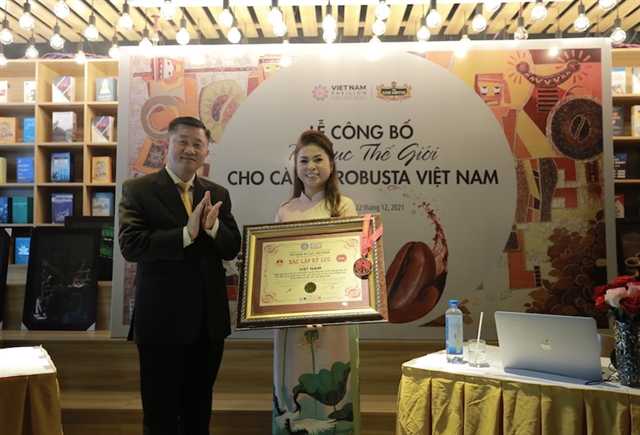HANOI, Vietnam – The World Records Union (WorldKings) has just recognised Vietnam as the largest producer and exporter of robusta coffee to the global market. It also recognised the country’s local blending as the world’s most unique and diverse art in blending, brewing and robusta coffee drinking.
After nearly three months of work to unify the documents and criteria, WorldKings officially decided to set a world record for Vietnam’s robusta coffee.
Receiving the recognition for the industry, CEO Lê Hoàng Diệp Thảo of TNI King Coffee, the firm which sent the nomination application in October, said: “This can be considered the most special event of Vietnam’s coffee industry. The recognition is an asset of the country and the Vietnamese people.”
TNI King Coffee will give the recognition certificate to the Ministry of Agriculture and Rural Development.
Nguyễn Văn Viễn, representative of WorldKings in Vietnam, said the recognition would help the world know more about the Vietnamese coffee brand, especially robusta coffee, creating advantages for Vietnam in the global coffee market.
Coffee has been the main export industry of the country for many years.
For the 2020-2021 crop, domestic robusta production reached more than 29,680 tonnes, while Brazil only had around 21,300 tonnes.
In the role of vice president of the Vietnam Cocoa Coffee Association, Thảo said Vietnam’s robusta coffee export output occupied an important position, accounting for 40 per cent of global production, sometimes reaching 60-70 per cent of global production for robusta coffee.
However, Vietnamese coffee was almost unknown to the world and no one mentioned robusta from Vietnam, said Thảo, adding: “This paradox needs to be rearranged.”
Thảo said Vietnam needed specific strategies right through from local coffee growers to the Government, ministries and agencies to develop a brand that helps millions of farmers gain value from coffee beans, thereby improving the quality of coffee in the country.
TNI King Coffee’s leader said the firm had many plans for global expansion, adding that it would enter the markets of seven regions in the world with appropriate strategies to help robusta coffee penetrate deeper, with many new products.
According to experts, a good cup of coffee needs a combination of robusta and arabica. Currently, the world supply of arabica is showing signs of shortage due to the increasingly harsh climate. Accordingly, the ratio of robusta to arabica will change, with more robusta coffee added, and Vietnam could take advantage of the shift.
Thảo said: “Affirming the value of Vietnamese robusta will be an important springboard for Vietnamese coffee to go further in the international arena.”
Thảo’s next business trip will be to the Dubai Expo to showcase Vietnamese coffee and to create conditions for King Coffee to promote the coffee World Record for Vietnam.
Thảo said: “King Coffee will co-operate with the Ministry of Culture, Sports and Tourism to organise Vietnam Day on December 30, and Vietnam Coffee Week from December 29.
According to the Ministry of Agriculture and Rural Development, coffee is one of Vietnam’s key exports, and the second largest agricultural export in terms of turnover after rice.
Robusta coffee accounts for nearly 90 per cent of coffee plantations nationwide, mainly in the Central Highlands provinces of Kon Tum, Gia Lai, Đắk Lắk, Đắk Nông and Lâm Đồng.
With the advantages of natural conditions, especially soil, the average coffee productivity in the country is the highest in the world at 2.8 tonnes per hectare, higher than in Brazil – the world’s number one coffee exporter, according to USDA data in 2020.
Earlier this month, a representative of the Ministry of Industry and Trade told local media that Vietnam would step up its processed coffee industry to take full advantage of benefits from free trade agreements, aiming for an export target of US$6 billion by 2030.















